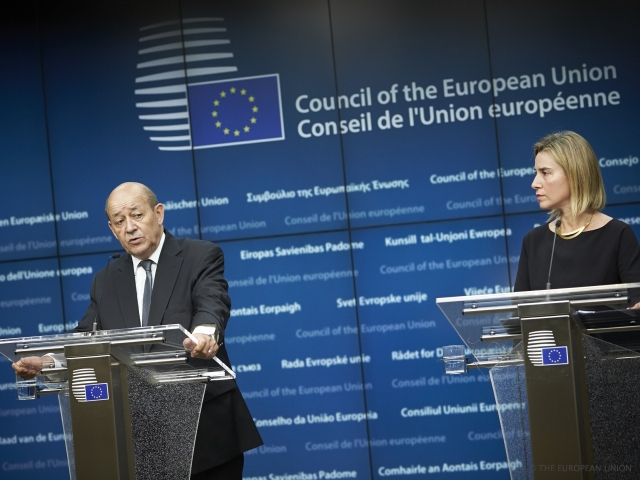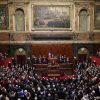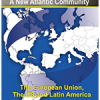
Jean-Yves Le Drian, French Minister of Defence; and Federica Mogherini, High Representative of the EU for Foreign Affairs and Security Policy ,at the 3426th Council of Foreign Affairs (Defence) on 17 November 2015. Photo: The European Union (Non Commercial Use).
Listening to La Marseillaise sung by spectators at Wembley Stadium during the England-France match was a moving experience. The Defence Ministers of the 28 meeting for the first time to unanimously activate Article 42.7 of the Treaty of the EU, appertaining to mutual assistance, was a milestone, although in terms of words rather than deeds. The specific form of assistance will be defined bilaterally, not from an overall EU standpoint. Underlying the apparent unity there still lurk widely differing conceptions of Europe.
It is well to remember that article says that
‘if a Member State is the victim of armed aggression on its territory, the other Member States shall have towards it an obligation of aid and assistance by all the means in their power’.
France, given its conviction that it has been at war with the Islamic State (Daesh) for months now, has chosen to activate this provision and not Article 222 of the Treaty on the Functioning of the EU –what a dreadful name–, which specifically refers to military or other aid ‘in the territory of the Member State’ after a terrorist attack or a natural disaster. That is, no action is to be taken on the international stage.
In the EU, which also comprises neutral countries, it is more a question of assistance than of mutual defence. Thus, it differs from NATO, whose North Atlantic Treaty’s article 5 stipulates that ‘an armed attack’ against one or more of them ‘shall be considered an attack against them all’ –although this does not imply an automatic response and has only been activated once, at the time of the 9/11 attacks–. The concept, appropriate to a military alliance, that an attack against one member is an attack against all, is not applicable to Article 5 of the Western European Union (WEU, which was dissolved in 2010 with the entry into force of the Treaty of Lisbon that incorporates some of its provisions). The latter’s members committed themselves, in the event of an ‘armed attack’ against one of them, to ‘afford the Party so attacked all the military and other aid and assistance in their power’, a commitment subsequently incorporated into Article 42.7 of the Lisbon Treaty.
France has requested assistance, either directly against Daesh to intervene in Syria and Iraq (only the UK and Denmark so far seem willing to do so), indirectly to replace French troops in the Sahel and elsewhere in Sub-Saharan Africa, especially Mali and the Central African Republic (Germany and Ireland have shown a certain willingness in this regard, although Spain –in the run-up to general elections– is merely ‘studying its offer’) or for other purposes. But assistance, as explained by the High Representative for Common Foreign and Security Policy, Frederica Mogherini, will not be planned at the EU level but bilaterally with Paris, which is much given to bilateralism. This means that, at least for now, there will be no operations or missions involving the EU’s Common Security and Defence Policy. The Union, according to Mogherini, can facilitate and coordinate matters ‘wherever useful and necessary’. This may end up by occurring: other French operations, such as Mali, started unilaterally and eventually came under the European mantle. But the step taken by Paris, had it been better articulated, could have become a major breakthrough for the purpose of consolidating a common defence policy, which many member states still view with suspicion.
France has preferred to invoke the European clause because, as its diplomats have explained, appealing to NATO would prevent the participation of Russia (and Turkey) in the new international coalition against the Islamic State that François Hollande is aiming for. He has also managed to have the UN Security Council unanimously approve a resolution to the effect that all members take all the ‘necessary measures’ to eliminate Daesh, but has not invoked the UN Charter’s Chapter 7 (‘use of force’), in order to enlist the support of Russia and China. This means that France has so far kept the EU, NATO and the UN as such at arm’s length. It is thus seeking a new kind of axis against Daesh, one with deep historical roots.
Following visits to London and Berlin, Hollande is travelling to Washington to talk to Barack Obama and to Moscow to coordinate with Vladimir Putin. The international revival of Putin and Russia, and the calls from the European Commission for more normalised relations between the EU and Moscow, have caused increasing concern to many governments in Eastern Europe, starting with the Baltic States and Poland, fearful of their powerful neighbour and anxious that the recent events in the Ukraine are not forgotten. Despite Hollande’s tactical manoeuvring, neither will be easy for him to overcome the mistrust between Moscow and Washington, and without America, Europeans have not much power to do anything.
Even the EU’s members themselves are finding it hard to agree on how to describe the situation. For instance, the Swedish Prime Minister Stefan Lofven, who is currently engaged in conducting counterterrorism operations in his own country, has said that ‘we are not at war’ but ‘will be with France and the EU’.
Preventive intelligence has failed. Mogherini herself has deplored the reluctance of member states to share information and intelligence in the fight against terrorism. There is coordination, but it is clearly insufficient. Deeper intelligence is not shared by the 28, only by the big players, including Spain. One of the most prominent pro-Europeans, Guy Verhofstadt, the former Belgian Prime Minister and now President of the liberal group in the European Parliament, has called for the creation of a European intelligence agency, a European corps of border guard and an EU coastguard.
The Home Affairs Ministers of the EU are now seeking to further boost cooperation and the exchange of intelligence data and in January Europol will launch its European Counter Terrorist Centre as well as new measures to strengthen external borders, especially in the Schengen free-movement area, in addition to the notorious Passenger Name Record (PNR) that has now been discussed for months. Thus more progress has been made in the field of policing than in the military sphere.
Criticism has been levelled at the intelligence failures in France and Belgium regarding suspects whose tracks have frequently been lost as they journeyed to and from Syria, as with the alleged mastermind of the Paris attacks, Abdelhabid Abbaaoud. A much more complicated case is that of the Bataclan suicide bomber, Samy Amimour, who has a totally new profile: coming from a secular Algerian family, he had a respectable job as a bus driver. To this should be added the terrorists’ weaponry, an ample supply of AK-47s, suspected to originate in the black market either in the Balkans or from the ruins of Libya.
Despite verbal solidarity –as it remains to be seen whether it will translate into practical help–, the divisions between European states reflect the split in their own societies. In France itself, where there has been broad support for the measures proposed by the government, the Socialist prime minister, Manuel Valls, was booed in Parliament for alleged security lapses before the attacks of 13 November, and Marine Le Pen has called for the government’s resignation while in the midst of a state of emergency. And this despite the current government having reversed the cutbacks in both numbers and equipment implemented by Nicolas Sarkozy.
In the UK, to the frustration of some Labour MPs, their leader, Jeremy Corbyn, has firmly rejected any demands by the Prime Minister, David Cameron, for parliamentary authorisation to use force against Daesh in Syria (as the British Armed Forces are already doing in Iraq), notwithstanding the Conservatives’ overall majority. As he views Europe, Cameron remains adamant that responsibility for security must remain a national concern. Meanwhile, at the EU’s eastern end, a number of governments have resorted to the excuse of security needs following the Paris attacks to tighten the control over their borders to keep out refugees from Syria.
This would have been a good opportunity to promote a common European defence policy against a common threat. But the crisis has crept up against Europe at the wrong time, riven by a number of growing cleavages. The Union has no common vision or sufficiently strong leadership to convert the reaction against the jihadist attacks into a further step along the much-needed road towards European integration.


